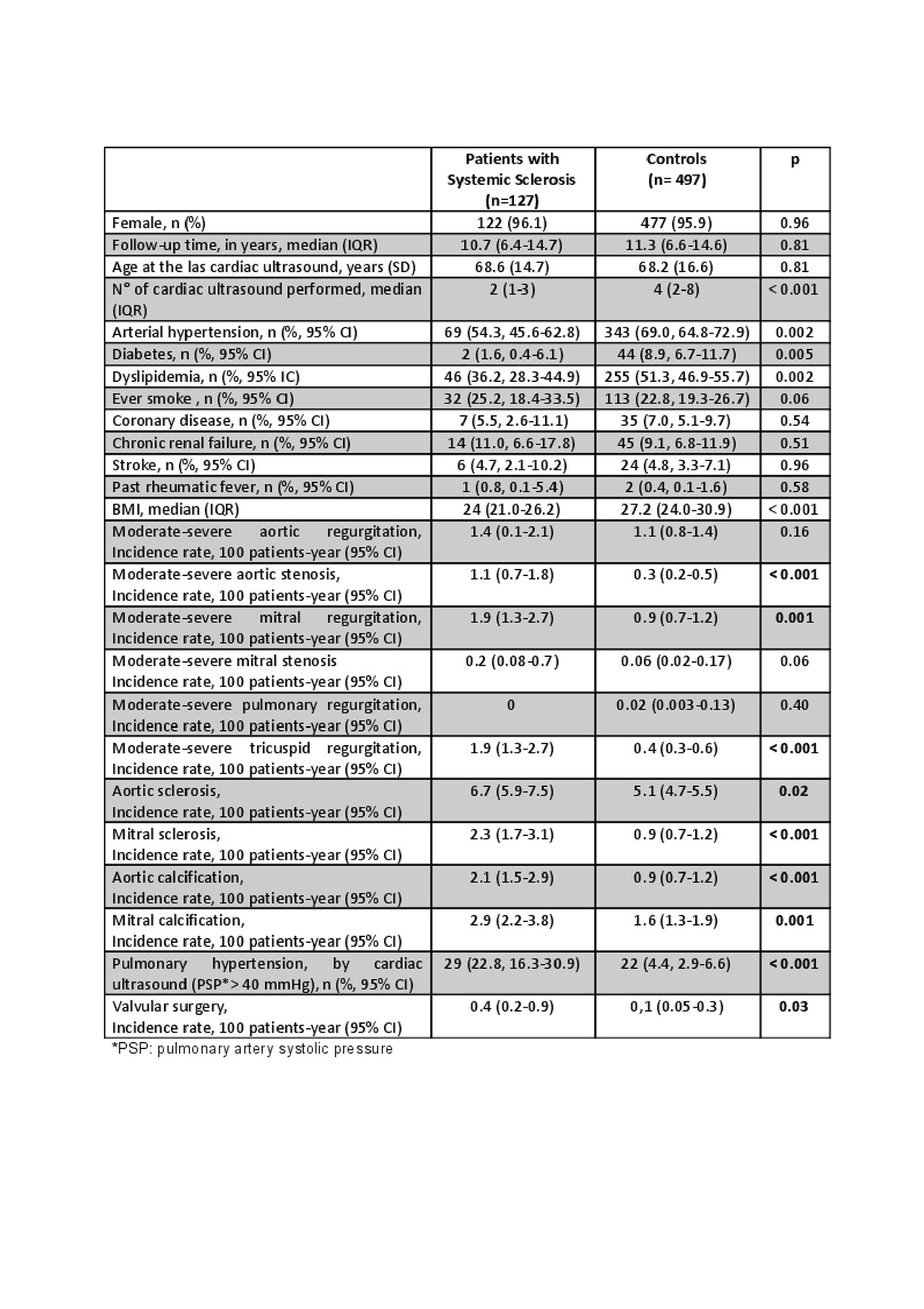Session Information
Session Type: Poster Session (Sunday)
Session Time: 9:00AM-11:00AM
Background/Purpose: Cardiac valve involvement in patients with Systemic Sclerosis (SSc) is uncommon, except for tricuspid regurgitation associated with pulmonary hypertension, and data regarding its frequency is inconsistent. Our objective was to estimate incidence rate of moderate to severe valvular disease in patients with SSc compared with controls.
Methods: We included patients with SSc diagnosis (ACR 2013 criteria) belonging to our health management organization (HMO) and followed by our unit from january 1st 2000 to december 31th 2017. Each patient with SSc was matched by age and sex with 3 to 4 controls of our HMO with at least 1 cardiac ultrasound performed during the study period. Subjects were followed until: a) their death, b) the end of the study, c) they voluntarily left the HMO. Electronic medical records were reviewed, demographic and disease characteristics were collected and incidence rates of valve involvement were calculated for each valve (moderate/severe valvular disease, valve calcification and valve sclerosis) and compared between SSc and controls.
Results: 127 patients with SSc (108 with limited and 18 with diffuse SSc; 96.1% females; 18.4% Scl-70 positive and 67.2% anti centromere positive) and 497 controls were included. Patients with SSC had significantly more incidence of aortic stenosis (1.1 vs 0.3 per 100 patients-year, p < 0.001), mitral regurgitation (1.9 vs 0.9 per 100 patients-year, p = 0.001) and tricuspid regurgitation (1.9 vs 0.4 per 100 patients-year, p < 0.001) than controls. Valvular surgery was significantly more frequent in SSc than controls (0.4 vs 0.1 per 100 patients-year, p = 0.03). Aortic sclerosis (6.7 per 100 patients-year), aortic calcification (2.1 per 100 patients-year), mitral sclerosis (2.3 per 100 patients-year) and mitral calcification (2.9 per 100 patients-year) were also more frequent in SSc patients than controls (p < 0.05 for all comparisons).
Conclusion: We found significant higher incidence rates of aortic stenosis, mitral regurgitation and tricuspid regurgitation in SSc patients compared to their matched controls. Patients with SSc also required more valvular surgery. Moreover, aortic and mitral valves sclerosis and calcification were found more often in SSc patient’s echocardiographies than in controls.

Risk of Heart Valve Disease in Systemic Sclerosis. Table
To cite this abstract in AMA style:
Alvarado R, Scolnik M, Marin Zucaro N, Alle G, Trasante Borches M, Catoggio L, Soriano E. Risk of Heart Valve Disease in Systemic Sclerosis [abstract]. Arthritis Rheumatol. 2019; 71 (suppl 10). https://acrabstracts.org/abstract/risk-of-heart-valve-disease-in-systemic-sclerosis/. Accessed .« Back to 2019 ACR/ARP Annual Meeting
ACR Meeting Abstracts - https://acrabstracts.org/abstract/risk-of-heart-valve-disease-in-systemic-sclerosis/
